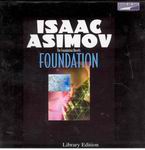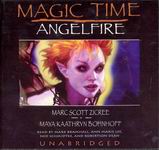
 Timescape
Timescape
By Gregory Benford; Read by Simon Prebble and Peter Bradbury
11 Cassettes – 15.75 Hours [UNABRIDGED]
Publisher: Recorded Books LLC
Published: 2001
ISBN: 0788763180
Themes: / Science Fiction / Hard SF / Time Travel / Alternate History / Quantum Physics / Science / Ecology / Philosophy / Astronomy / Britain / USA /
Winner of both the Nebula Award and the John W. Campbell Awards for best science fiction novel, Timescape is an enduring classic that examines the ways that science interacts with everyday life to create the many strange worlds in which we live. In a future wracked by environmental catastrophe and social instability, physicist John Renfrew devises a longshot plan to use tachyons–strange, time-traveling particles–to send a warning to the past. In 1962, Gordon Bernstein, a California researcher, gets Renfrew’s message as a strange pattern of interference in an experiment he’s conducting. As the two men struggle to overcome both the limitations of scientific knowledge and the politics of scientific research, a larger question looms: can a new future arise from the paradox of a forewarned past? With multiple plot lines and diverse characters, Timescape offers something for all lovers of fascinating science and great fiction. Simon Prebble and Peter Bradbury combine for a narration that skillfully uncovers the mysteries beneath our understanding of the universe.
Timescape is a deep novel that explores characters, causal paradoxes, politics, history and physics over time all with equal skill. And despite the serious nature of the narrative there are even a few laughs in there! This isn’t just science fiction it is scientist fiction, that is it is fiction that shows how scientific experimentation in the modern university setting works. Benford, is himself a scientist and he doesnt dumb down the book for us amateurs. I was very surprised that I hadn’t heard how good this novel was previously. I count myself as a fairly knowledgeable fan of science fiction and yet somehow the certain fame of this novel slipped under my radar. I was pleased and surprised as Timescape approaches greatness in it’s chosen domain.
Appropriately Simon Prebble, with his English accent, reads the 1990s chapters of the novel, which are primarily set in England, while Peter Bradbury with his American accent reads the 1960s chapters, set mostly in California. This is the kind of book that was a natural for dual narration. Bradbury and Prebble are both excellent, pronouncing nearly every technical term correctly, in this hard science heavy novel that is no small feat! Recorded Books’ original cover art for this audiobook is even more evocative than the paperback and hardcover editions. Nice work RB! But it’s not all praise. First is an attribution mistake on the front cover of the audiobook, the copy reads “narrated by Simon Prebble and Peter Bradley” (it should read “Bradbury” not “Bradley”). There was also a problem plaguing my copy of Recorded Books cassette audiobooks – the sound level. It may have been only a problem with my copy, but in order to hear this audiobook I had to crank up the stereo to its maximum output level. Recorded Books does however offer to replace defective cassettes, and if the recording level were any lower I’d have to seriously consider taking them up on it. Likely this wouldnt be a factor at all with the CD version but there isn’t a CD version available at this time.
Posted by Jesse Willis


